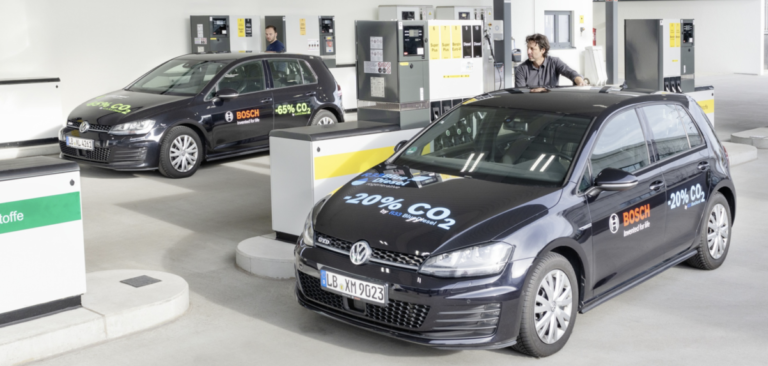Following the introduction of R33 Blue Diesel, Bosch, Shell and Volkswagen have developed another low-carbon fuel. Blue Gasoline is said to contain up to 33% renewables and enable a 20% reduction in carbon emissions per kilometer driven.
It is estimated that a hypothetical fleet of 1,000 VW Golf VIII 1.5 TSIs could save more than 230 metric tons of CO₂ per year if all the vehicles were to travel 10,000 kilometers. Shell is planning to offset the remaining carbon emissions through certified offset arrangements. The trio aims to make the fuel available at filling stations in Germany this year.
Blue Gasoline complies with the EN 228/E10 standard and exceeds the parameters set for storage stability and boiling behavior. It also features an additive package that allows for its use in existing filling stations and vehicles that currently run on Super 95 E10 gasoline.
The renewables in Blue Gasoline comprise biomass-based naphtha or ethanol certified by the International Sustainability and Carbon Certification (ISCC) system. A source of biomass-based naphtha is tall oil, which is a by-product of pulp used in the production of paper.
As part of the collaborative project, the trio jointly defined the fuel specification to be achieved, with engine requirements and sustainability being the main focus. During the development process, intensive test programs were carried on test benches and in engines in trial vehicles.
Bosch is to debut the sustainable fuel at company filling stations from May 2021, beginning with its Schwieberdingen site in Germany, and then subsequent stations at the Feuerbach and Hildesheim sites later in the year with the aim of phasing out Super 95 E10 gasoline.
“On the road to climate-friendly mobility, we must ensure we don’t leave any technical opportunities untapped, starting with electromobility and ending with renewable fuels,” commented Uwe Gackstatter, president of the Bosch Powertrain Solutions division. “Every bit of CO₂ we save can help us achieve our climate targets.”
To promote rapid market uptake for these sustainable fuels, the focus is on renewable biomass and synthetic fuel components that can be blended into regular fuel while staying in line with existing fuel standards. By using these new sustainable fuels, Bosch aims to demonstrate that it is not just the responsibility of new vehicles to reduce the transport sector’s CO₂ emissions, but it is also up to existing fleets to do the same.
Sebastian Willmann, head of internal combustion engine development at Volkswagen, said, “Blue Gasoline is another building block in the effective reduction of CO₂ emissions from the vehicle fleet. Blue Gasoline’s high storage stability makes the fuel particularly suitable for use in plug-in hybrid vehicles. In the future, the expansion of the charging infrastructure and larger batteries will mean that these vehicles predominantly run on electric power, and thus that fuel may remain in the fuel tank for longer periods of time.”


